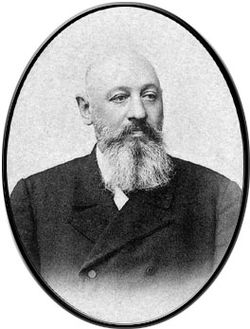Dmitry Sipyagin
Dmitry Sergeyvich Sipyagin | |
|---|---|
Дмитрий Сергеевич Сипягин | |
 | |
| Minister of Interior of the Russian Empire | |
| In office 20 October 1899 – 2 April 1902 | |
| Monarch | Nicholas II |
| Preceded by | Ivan Goremykin |
| Succeeded by | Vyacheslav von Plehve |
| Governor of Moscow | |
| In office 20 December 1891 – 31 May 1893 | |
| Preceded by | Vladimir Golitsyn |
| Succeeded by | Alexander Bulygin |
| Governor of Courland | |
| In office 31 March 1888 – 20 December 1891 | |
| Preceded by | Konstantin Pahschenko |
| Succeeded by | Dmitry Sverbeyev |
| Personal details | |
| Born | Dmitry Sergeyevich Sipyagin March 20, 1853 Kiev, Russian Empire |
| Died | April 2, 1902 (aged 49) --> Mariinsky Palace, Russian Empire |
| Nationality | Russian |
Dmitry Sergeyevich Sipyagin (Дмитрий Серге́евич Сипягин) (March 20 [O.S. March 8] 1853 – April 15 [O.S. April 2] 1902), a Russian statesman.
Political career
Born in Kiev, Sipyagin graduated from the Judicial Department of St Petersburg University in 1876. Served in the MVD as Vice-Governor of Kharkov (1886-1888), Governor of Courland (1888-1891) and Governor of Moscow (1891-1893). Deputy of the Minister of State Property (1893); Deputy of the Minister of Interior (1894); Executive Director on the petitions of the Imperial Chancellery (1895-1899); Director of the Ministry of Interior (1899); Minister of Interior (1899). He remained the interior minister from 20 October 1899 to 2 April 1902.
He was assassinated in the Mariinsky Palace by Socialist-Revolutionary Stepan Balmashov. His death was a severe setback to Sergei Witte, the finance minister, who had been supported by Sipyagin but would be challenged by his successor, Vyacheslav von Plehve.[1]
Honours
Sipyagin received the Order of Saint Vladimir as an Imperial favour for the New Year 1900, shortly after accepting the position as Minister.[2]
References
